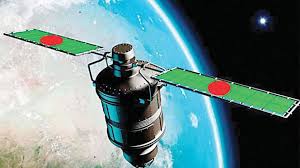How the Bangabandhu Satellite will take flight
May 4 is set to be a historic day for Bangladesh as it prepares to launch its first satellite into orbit from the SpaceX launch station in Florida.
The satellite will be borne by a SpaceX Falcon-9 rocket and the launch will be streamed live on the SpaceX website. The time for the launch will be finalised later.
"This is the same launch station from where a Korean satellite was launched on Oct 30. That satellite was tagged KT. Our satellite will say BB on the side and bear a government logo," project director Md Mezbahuzzaman told bdnews24.com on Sunday.
The satellite was originally scheduled for launched on Dec 16 but the devastation from Hurrican Irma last year delayed all the scheduled launches from Cape Canaveral, Florida.
The BB satellite has 40 transponders. Bangladesh will use 20 of them, saving the national exchequer around $14 million a year. The 20 others will be rented out.
The project director said a person had to be within three or four kilometres from the launch pad to see the take-off with their own eyes. It will remain visible for around 7 minutes, he added.
.jpg)
"The 7-metric tonne satellite will travel up to 36,000 km from the launch pad before making adjustments for orbit," Mezbahuzzaman said. "Preparations for the launch have already begun."
The Bangabandhu Satellite was manufactured at the Thales Alenia Space Facility in France. After construction, tests, inspection and transfer it was brought to the Cape Canaveral launch site aboard a cargo flight.
Project Director Md Mezbahuzzaman described to bdnews24.com the process by which the satellite will be launched into orbit.
The Falcon-9 rocket has four parts, with the satellite on top, followed by the adaptor. Below the adaptor is Stage-2 of the rocket, while the lowest section is Stage-1.
“During take-off Stage-1 will fire and will carry the spacecraft upwards with tremendous speed,” said Mezhbahuzzaman.
At one point the Stage-1 rockets will be jettisoned and fall back to Earth and the Stage-2 rockets will begin firing. Stage-2 will carry the spacecraft to 35,700km before being jettisoned and will linger in orbit at a certain distance from the satellite.
The entire launch process has two phases, the project director said. The first phase is the Launch and Early Orbit Phase (LEOP) and the second phase is Satellite in Orbit. The LEOP phase will take 10 days while the second will take 20 days.
After the satellite becomes active its control will shift to three ground stations in the US, Italy and Korea, said Md Mezbuzzaman.
“The three stations will take control of the satellite ad move it 300km to its assigned position (119.1 east longitudinal orbital slot).”
It will take nearly 20 days to bring the satellite under complete control, he said. Once it is completely operational, the control will be transferred to the ground stations in Bangladesh.
The Bangabandhu Satellite’s ground stations have been built in Gazipur’s Joydebpur and Rangamati’s Betbunia.